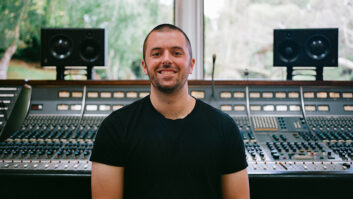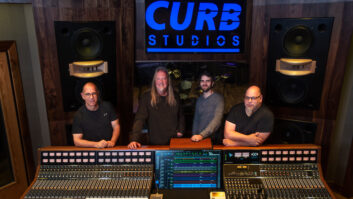This week, I listened to some of the worst tracks I’ve heard in years. It was a standard (guitars/bass/drums/vox) rock project that any pro could have mixed in his/her sleep. I was aghast at this lifeless, mushy mix — and so was my buddy Walter, who, as a friend of the band, brought the FireWire drive containing the tracks by my studio. Certainly, a new mix could fix everything — or at least ease some of the pain.
The story began months ago, with the band hearing some decent mixes from a guy’s bedroom studio; he offered to do the album for about $2,000, paid part in cash and part with the band buying a plug-in suite he needed. This was the first of many clues indicating that something wasn’t right, but as recording novices, the band didn’t pick up on these until it was too late. Another clue? The drum miking employed novel methods such as placing the “overhead” mics low and pointing toward the edge of the cymbals. There was no ping, but plenty of a strange phasing effect as the cymbal wash moved above and below the capsules’ axis. The peak levels on the DAW tracks varied from -40 dB to beyond-clipped square waves. The miked guitars were mush, the bass indistinct and the singer had intonation problems that were never recut. Things can sometimes be fixed in the mix, but working on these tracks was nearly impossible.
Unfortunately, the band felt that the problem stemmed from them not having enough money and got what they paid for. Not so! This well-rehearsed band with a tight drummer could have gone into any number of smaller studios, spent a couple days tracking, a couple days mixing and have a great result. Well after the fact, the band found out the demo tracks the engineer played for them were from a band that mixed themselves and went direct on everything except for the drums, which were cut at a demo service where a hot studio drummer plays/records tracks for your songs.
I should emphasize that this is not an indictment of project studios, but of incompetent people who — having bought some gear — think they know how to use it. The lesson here is to shop around. Business is slow in the studio industry, creating a buyer’s market — sometimes a $150/hour room can go for $80 or a $100/hour room for $40, depending on demand. If you’re on a budget, most studio owners are glad to work with you. If you’re flexible about time, then ask if there’s a slow time — maybe a late-night session when you can get a better rate. A producer I know gets insanely low lockout rates to track at high-end studios by booking the week between Christmas and New Year’s — traditionally slow times in some industries.
A little creativity and a few phone calls can really pay off. But once those hot tracks are mixed, make sure your budget includes some dough for real mastering. Sure there are plenty of mastering gizmos and plug-ins out there, but there’s also a reason why top artists turn to the golden ears of a pro mastering engineer to give their releases that major-label sound. And after all the time, effort and money you’ve spent on your project, doesn’t your work deserve it?







